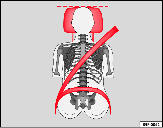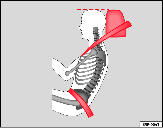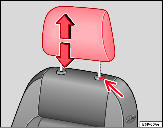
Seat Ibiza: Head restraints
Seat Ibiza Owners Manual
Correct adjustment of head restraints
Properly adjusted head restraints are an important part of occupant protection and can reduce the risk of injuries in most accident situations.

Fig. 72 Front view: head restraints and seat belts correctly adjusted

Fig. 73 Side view: head restraints and seat belts correctly adjusted
– Adjust the head restraint so that its upper edge is at the same level as the top of your head, or as close as possible to the same level as the top of your head and, as a very minimum at eye level ⇒ fig. 72 and ⇒ fig. 73.
Adjusting the head restraints.
WARNING
• Travelling with the head restraints removed or improperly adjusted increases the risk of severe injuries.
• Improperly adjusted head restraints could lead to death in the event of a collision or accident.
• Incorrectly adjusted head restraints also increase the risk of injury during sudden or unexpected driving or braking manoeuvres.
• The head restraints must always be adjusted according to the occupant's size.
Removing or adjusting head restraints
The head restraints can be adjusted by moving them up and down.

Fig. 74 Adjusting and removing the head restraints
Adjusting height (front seats)
– Press the button on the side and pull upwards to the desired position. – To lower the head restraint, press the button and push head restraint downwards. – Make sure that it engages securely into position.
Adjust height (rear outer seats)
– Press the button on the side and pull upwards or downwards to the desired position.
– Make sure that the head restraint engages securely in one of its positions.
Adjusting height (rear central seat)
– Press the button on the side and pull upwards to the desired position. – To lower the head restraint, press the button and push head restraint downwards. – Make sure that the head restraint engages securely in one of its positions.
Angle adjustment (front seats)
– Press the head restraint forward or back to the required position.
Removing the head restraint
– Push the head restraint up as far as it will go. – Press the button ⇒ fig. 74 (arrow). – Pull head restraint out of fitting without releasing the button.
Fitting the head restraint
– Insert the head restraint into the guides on the rear backrest. – Push head restraint down. – Adjust the head rest to suit body size.
WARNING
• Never drive if the head restraints have been removed. Risk of injury.
• Never drive if the head restraints are in an unsuitable position, there is a risk of serious injury.
• After refitting the head restraint, you must always adjust it properly for height to achieve optimal protection.
• Please observe the safety warnings, “Correct adjustment of head restraints”.

Note
• To fit and remove the rear head restraints, gently tilt the seat back forwards.
• When fitting the head restraints again, insert the tubes as far as possible into the guides without pressing the button.
Other info:
Honda Fit. Instrument Panel
Gauges/Information Display/System Indicators
Lights Reminders
System Indicators
System Indicators
System Indicators
System Indicators
...
Chevrolet Sonic. All-Season Tires
This vehicle may come with all-season tires. These tires are designed to provide
good overall performance on most road surfaces and weather conditions. Original
equipment tires designed to GM's sp ...
Peugeot 208. Service indicator
System which informs the driver when the next service is due, in accordance with
the manufacturer's servicing schedule. The point at which the service is due is
calculated from the last indica ...
Manuals For Car Models
-
 Chevrolet Sonic
Chevrolet Sonic -
 Citroen C3
Citroen C3 -
 Fiat Punto
Fiat Punto -
 Honda Fit
Honda Fit -
 Mazda 2
Mazda 2 -
 Nissan Micra
Nissan Micra -
 Peugeot 208
Peugeot 208 -
 Renault Clio
Renault Clio -
 Seat Ibiza
Seat Ibiza -
 Skoda Fabia
Skoda Fabia - Honda Pilot
- Volkswagen ID4
- Toyota Prius


